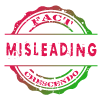Coca-Cola has been going through heated arguments and conversations for decades. In this era of social media, many social media users are comparing Coca-Cola with other beverages and saying it’s better or worse than those, etc.
Social Media Posts
Social media posts say Coca-Cola is better than Tropicana health-wise. A video claims that Tropicana apple juice (while showing a pack of Apple Delight) contains artificial ingredients, including flavoring agents and sweeteners, and suggests that Coca-Cola may be a “slightly better” or “healthier” choice in comparison. The video warns against falling for marketing tricks and encourages viewers to drink diet Coke or water instead. This fact-check will investigate the nutritional and ingredient-based basis of the comparison and determine whether the claim holds up scientifically.
Fact Check
- Does Tropicana Apple Delight contain artificial flavors, sweeteners, or additives that make it unhealthy?
Tropicana Apple Delight (Asia) vs. Tropicana 100% Juice (US/UK): Tropicana’s Apple Delight fruit beverage (e.g., sold in India) is not 100% juice — it contains added sugar, an acidity regulator, permitted natural colors (caramel E150d), a stabilizer, and flavorings labeled as “natural and nature-identical.” For example, one 1 L carton lists ingredients as water, 4–7% apple concentrate, sugar, acidity regulator, “flavor (natural and nature identical),” color (E150d), and steviol glycoside (E960a, a plant-based non-caloric sweetener). While Apple Delight does not contain legally defined artificial flavors or artificial sweeteners, it still delivers a high level of added free sugar and uses a sweetener, making it a sugary drink rather than a health beverage. By contrast, Tropicana’s U.S./UK apple juice products are typically pure fruit juice with no added sweeteners or artificial additives, for example, Tropicana 100% Apple Juice lists only apple juice (plus minor added vitamins/acid). In short, “Apple Delight” is a juice drink with added sugar and flavoring, not simply “all juice.” More details about the apple juice can be read here.
2. Is Coca-Cola free of artificial ingredients, making it a “healthier” alternative to fruit juice/beverages?
Coca-Cola ingredients (US/UK): Coca-Cola is not free of additives. U.S. Coca-Cola Classic is made with carbonated water, high-fructose corn syrup (HFCS), caramel color (E150d), phosphoric acid, “natural flavors,” and caffeine. Mexican/UK Coke uses sugar instead of HFCS but still has the same caramel color, acid, natural flavorings, and caffeine. In other words, Coke contains a processed sweetener (sugar or HFCS), chemical acidifiers, and colorants—it is not an all-natural product. The claim that Coke has “no artificial ingredients” is false: it has added caramel coloring and flavorings just like many processed foods.
3. Is it scientifically accurate to say that Coca-Cola is better for health than a juice-based beverage like Tropicana?
Sugar content and health guidelines: The main health concern for both beverages is sugar. Coca-Cola (US) has about 39 g added sugar per 12 oz can (≈11 g/100 ml), and even Tropicana Apple Delight (which is only partly juice) has roughly 10 g sugar per 100 ml. Even if we consider Tropicana apple juice, a serving of Tropicana 100% apple juice still delivers a large sugar load. For instance, a 10 fl. oz. bottle of Tropicana (296 ml) has about 140 calories and 31 g of sugar (all from the fruit). When we consider about 100 ml, Tropicana apple juice also has 10 grams of sugar per 100 ml. The UK NHS and WHO classify fruit juice sugars as “free sugars” (like soda) and advise strict limits: for example, UK guidelines say unsweetened fruit juice counts as sugary and should be limited (≤150 ml/day). A WHO report explicitly includes sugar in fruit juices in its “free sugars” recommendation (≤10% of energy). In practice, both soda and juice can deliver similar sugar loads (e.g., a can of cola can have ≈9 sugar cubes, often exceeding daily sugar limits).
According to the WHO guidelines, the maximum intake of sugar for an adult should be 50 grams, and it is advised to reduce this to as little as 25 grams per day. WHO guidelines can be read here.
4. Do non-caloric sweeteners like steviol glycoside pose health risks or offer benefits in juices compared to sugar in soft drinks?
Noncaloric sweeteners (stevia) vs. sugar: Tropicana Apple Delight uses steviol glycoside (stevia extract) as a sweetener alongside sugar. Stevia-based sweeteners are approved by the FDA and EFSA and do allow reducing calories compared to pure sugar. However, WHO’s latest guidance cautions that non-sugar sweeteners (including stevia) have not been shown to improve health outcomes and should not be used long-term to control weight or replace sugar; they advise reducing sweetness overall and focusing on unsweetened foods and water. In short, stevia is considered safe in moderation, but swapping sugar in soda for any sweetener (natural or artificial) doesn’t automatically make a drink “healthy”—it’s still best to cut sugary drinks altogether.
Conclusion
The viral claim is misleading. Tropicana Apple Delight contains added sugars alongside fruit juice, while Coca-Cola includes ingredients like caramel color, acidulants, and sweeteners. Both beverages contain similar amounts of sugar per serving (approximately 10g per 100ml). Health organizations including WHO, NHS, and AHA advise moderation with both soda and fruit juice due to their sugar content. For those seeking alternatives with better nutritional profiles, water, unsweetened beverages, and whole fruits provide options with fewer free sugars and more nutrients.

Title:Is Coca-Cola healthier than Tropicana??
Fact Check By: Rashmitha DiwyanjaleeResult: Misleading


